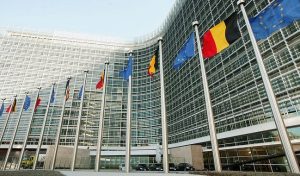A new position paper by Corporate Leaders Group Europe has called on the European Union to reduce its 2040 greenhouse gas emissions by at least 90%.

The report asks the EU to set a net reduction target of at least 90%, compared to 1990 levels, to avoid passing irreversible tipping points. This should include no more than 8-10% coming from carbon removals.
CLG Europe members, from Coca Cola, Unilever and Salesforce to Velux and Signify, are in support of this target. It follows a recent commitment by companies such as Coca Cola, Salesforce and GSK to reach net-zero emissions by 2040 under the Climate Pledge.
The target of at least 90% represents a level of ambition aligned with the Paris Agreement – to limit global warming to 1.5°C degrees. It is based on assessments conducted by the European Scientific Advisory Board on Climate Change (ESABCC), and modelling by organisations such as Climact and Agora Energiewende.
The report emphasises that this target is fit to reflect the urgency of the climate, nature and energy crises. It is adequate, science-based and will allow for steep emissions cuts over the next decade.
The 2040 target debate is an opportunity for the EU to send a clear signal to businesses that climate action will remain at the heart of the EU’s political agenda for the next two decades, according to the report. This will provide them with the predictability they need to invest early in the transition.
Examples in the report include switching to low carbon energy, decarbonising building stock and developing low carbon materials.
The report states that investment from businesses would have multiple knock-on benefits, from creating new jobs and generating economic growth, to improving health and well-being and advancing competitiveness.
However, more investment is still needed to decarbonise sectors where solutions are not yet available, such as heavy industry (especially cement), aviation and shipping.
Finally, the report lays out 10 principles the EU needs to follow to reach the 2040 target:
- Accelerate electrification, energy efficiency and phase out fossil fuels.
- Ensure that the costs and benefits of the transition are equitably distributed.
- Embed the principle of competitive sustainability into the EU’s industrial strategy and climate policies.
- Deploy all available levers to rapidly reduce emissions from the buildings sector.
- Harness circular economy and eco-design solutions for environmental and climate benefits.
- Harness the synergies between climate and nature objectives.
- Adopt a realistic and evidence-based approach to carbon removals.
- Significantly increase EU and national budgetary allocations for climate and nature.
- Set a post 2030 climate and energy political framework building on the successful implementation of the Fit for 55 Package.
- Be at the forefront of decarbonisation efforts globally.
In order for at least a 90% reduction in emissions by 2040, there must be sufficient progress in the EU by 2030. Meeting the current 55% GHG reduction goal will be an essential pre-requisite, according to the report.
As the EU is currently not on track to achieve this target, urgent action is needed to accelerate large-scale deployment of existing low-carbon technologies.
According to the report, an ambitious 2040 target would indicate the EU’s intention to continue to lead internationally. A substantially lower target would demonstrate a lack of commitment and lead to the planet passing irreversible tipping points.
Courtesy: Climate Action
